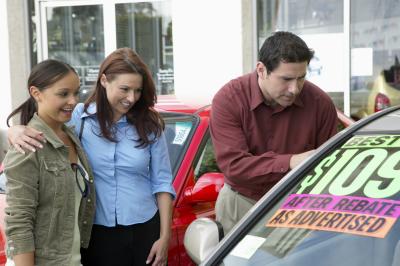Knowing the history about a used car gives a buyer important information for making a purchasing decision. Several popular websites provide vehicle history reports. Potential used car buyers can either purchase or opt to receive a free report. However, purchased reports provide detailed information that free reports often omit. Although vehicle history reports document some accurate information, buyers also need to consider other factors.

Smart shoppers are taught to ask questions, read product reviews, check the details and, in the case of used car buyers, do a background check. This is all prudent advise, but doesn't guarantee a fair deal. Vehicle history reports are popular among used car buyers. There are four major suppliers for such reports: Carfax (carfax.com $30), autocheck (autocheck.com $15), National Insurance Crime Bureau (www.nicb.org) and National Motor Vehicle Title Information Systems (www.nmvtis.gov). All four of these companies provide important purchasing information, but these reports also, for various reasons, miss data about an automobile's history.

Many used car buyers rely on history reports before signing on the dotted line. Dealerships offer free history reports to consumers. But these reports need to be put into proper context. The reports use vehicle title "branding" to indicate the status of the car. Popular branding terms include clean, salvage, theft and total loss. However, studies suggest reports with "clean" results did not reveal the car's history of serious repairs due to diverse calamities. According to consumerreports.org, "We found that the reports were most likely to be incorrect for vehicles that had serious damage but for various reasons were not declared a total loss."

There is some explanation for incorrect clean title branding. Clean title wrecks are popular among buyers at auctions who repair the damage and resell them to trusting consumers. Clean title wrecks are also common in the following situations: the owner didn't have collision insurance; the car was self-insured (rental cars and fleet vehicles); damage is considered less than "total loss" damage. Moreover, in states with lenient laws, scammers apply low-quality repairs to wrecked vehicles and then re-title them as clean—a process called "title washing."

The process for tracking the history of used automobiles is, at times, flawed and even abused. But the four major suppliers of used car reports are initiating steps to ensure accurate information. Carfax and Autocheck are implementing policies that guarantee the buyback of a vehicle purchase based on an inaccurate report—but stringent rules apply. Read the disclosures on the report, especially details about limitations and guarantees.

When purchasing a used car, vehicle reports are one of several steps toward making an informed decision. Test drive the car and listen for strange noises, check for steering difficulties and for the smell of mildew, which can reveal water damage. Check underneath the car for liquid spills. The car's paint may indicate past bodywork. It is also beneficial to schedule an inspection with a trusted mechanic. Buying a used car involves potential risks but, by conducting due diligence, buyers can maximize their potential for negotiating a fair deal.
